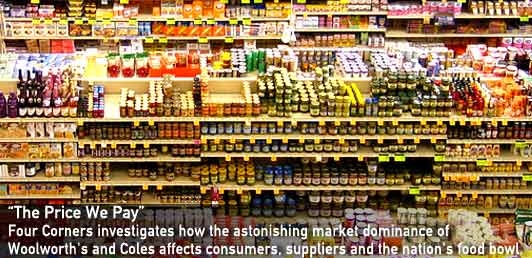The Price We Pay
 Supermarkets have bulked up. These days they're retail superpowers who make money not just when we eat or drink but increasingly when we fill the petrol tank, play pokies or buy a hammer from the local hardware - and they're quietly stalking pharmacies, newsagents and florists.
Supermarkets have bulked up. These days they're retail superpowers who make money not just when we eat or drink but increasingly when we fill the petrol tank, play pokies or buy a hammer from the local hardware - and they're quietly stalking pharmacies, newsagents and florists.
But food is their staple. Coles and Woolworth's sell 70 per cent of the dry groceries and half the fresh food that Australians consume - among the highest concentrations of market power in the developed world.
Last month the competition watchdog the ACCC officially ticked this arrangement, insisting the market is working.
But the growth in supermarket muscle has come at a cost to many suppliers and small retailers. "Crippling" is how one industry analyst terms Coles' and Woolies' power over food producers; the regulator calls it "simply tough dealing".
"It's just eating my farm away, we're just finished," says a despairing pumpkin grower whose produce retails for as much as 10 times the price he gets for it. He scoffs at the ACCC's view that the gap between farm gate prices and the checkout isn't growing. Don't like pumpkin? How about an ice-cream story to illustrate supermarkets' throat-hold? Four Corners meets an ice-cream maker who buys a lot of milk - and bizarrely he gets it cheaper from his local supermarket than from the wholesale processor. Why? Because the wholesaler has to accept ultra low prices from the supermarket - and compensates by inflating his price to smaller buyers, says the ice-cream man. Or try sausage. One sausage-maker explains the choice he made when the supermarket told him he had to cut his supply price or get kicked off the shelf: "The only way we would do that was by using lesser quality meat product... and adding soy proteins and what some people might call 'fillings' to extend the product." He then volunteers to Four Corners that he wouldn't even eat the product himself. Suppliers can reel off a list of punishing "rebates" - fees - that they must pay supermarkets for product promotions, to get paid on time, or just for the privilege and opportunity of supplying goods. But few are bold enough to do so publicly. Like suppliers to the big supermarkets, minnow retailers are fed up - but more outspoken. Small liquor merchants can get some beer and wine cheaper from supermarket-owned retail grog barns than they can from wholesalers. Some refuse to see this as competition: "In the 36 years I've been in our two shops I've had 12 armed hold-ups, 11 with a gun and one with a machete, and the biggest predator we face is this company here." While Coles' and Woolies' market clout can translate into cheap prices for consumers, there are fears it may threaten the survival of Australia's food industry. As reporter Stephen Long reveals, these concerns are held by eminent people at the very top of the food chain.
FULL SYNOPSIS
But the growth in supermarket muscle has come at a cost to many suppliers and small retailers. "Crippling" is how one industry analyst terms Coles' and Woolies' power over food producers; the regulator calls it "simply tough dealing".
"It's just eating my farm away, we're just finished," says a despairing pumpkin grower whose produce retails for as much as 10 times the price he gets for it. He scoffs at the ACCC's view that the gap between farm gate prices and the checkout isn't growing. Don't like pumpkin? How about an ice-cream story to illustrate supermarkets' throat-hold? Four Corners meets an ice-cream maker who buys a lot of milk - and bizarrely he gets it cheaper from his local supermarket than from the wholesale processor. Why? Because the wholesaler has to accept ultra low prices from the supermarket - and compensates by inflating his price to smaller buyers, says the ice-cream man. Or try sausage. One sausage-maker explains the choice he made when the supermarket told him he had to cut his supply price or get kicked off the shelf: "The only way we would do that was by using lesser quality meat product... and adding soy proteins and what some people might call 'fillings' to extend the product." He then volunteers to Four Corners that he wouldn't even eat the product himself. Suppliers can reel off a list of punishing "rebates" - fees - that they must pay supermarkets for product promotions, to get paid on time, or just for the privilege and opportunity of supplying goods. But few are bold enough to do so publicly. Like suppliers to the big supermarkets, minnow retailers are fed up - but more outspoken. Small liquor merchants can get some beer and wine cheaper from supermarket-owned retail grog barns than they can from wholesalers. Some refuse to see this as competition: "In the 36 years I've been in our two shops I've had 12 armed hold-ups, 11 with a gun and one with a machete, and the biggest predator we face is this company here." While Coles' and Woolies' market clout can translate into cheap prices for consumers, there are fears it may threaten the survival of Australia's food industry. As reporter Stephen Long reveals, these concerns are held by eminent people at the very top of the food chain.
